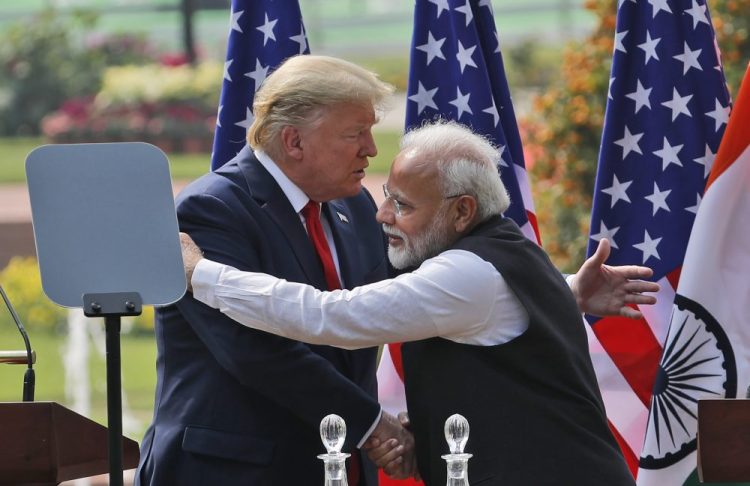NEW DELHI — Defending the host who has showered him with pageantry, President Trump refused Tuesday to speak out publicly against an Indian citizenship law pushed by Prime Minister Narendra Modi that has sparked deadly protests over discrimination against Muslims during the president’s visit.
With at least 10 people killed in violent protests during his two-day visit, Trump told reporters that he didn’t want to discuss the amendment that provides fast-track naturalization for some foreign-born religious minorities but not Muslims. The law is raising fears the country is inching nearer to a religious citizenship test.
“I want to leave that to India and hopefully they will make the right decision,” Trump said. A senior administration official had told reporters before the trip that the U.S. was concerned about the developments.
The tip-toeing came as Trump was winding up a 36-hour visit to the subcontinent in which he was showered with praise at a mega rally in Ahmedabad, toured the majestic Taj Mahal, and held talks with Modi. Cities were plastered with billboards heralding Trump’s arrival, his travel routes were lined with enthusiastic crowds, and colorfully costumed dancers and musicians entertained him at every turn.
As Trump was being feted, at least 10 people were killed and 150 injured in two days of clashes between supporters and opponents of the new citizenship amendment. On Tuesday, an angry group of Hindus carrying pickaxes and iron rods hurled rocks at Muslims. Protesters in several areas of northeast Delhi threw stones and set shops and vehicles on fire.

Indian security officers guard a street in New Delhi, India, on Tuesday after at least seven people, including a police officer, were killed and dozens injured in clashes, police said. Sheikh Saaliq/Associated Press
And black smoke rose into the sky after Hindu protesters set fruit and vegetable shops and a Muslim shrine on fire in northeast New Delhi, witnesses said. Police fired tear gas to disperse the crowds.
Asked about the protests during a press conference before his departure, Trump said he had raised the issue of religious freedom with Modi and that the prime minister was “incredible” on the subject.
“He wants people to have religious freedom,” said Trump, who shares much in common with Modi in both substance and style. The president himself proposed temporarily barring all Muslims from entering the U.S. during his 2016 campaign and successfully implemented a travel ban that targets travelers from certain majority-Muslim countries. Trump spoke at length during Monday’s rally about the threat posed by “radical Islamic terrorism” and his administration’s efforts to defeat it.
While Monday’s events were mostly for show, Trump turned to substance Tuesday, spending much of the day meeting with Modi in New Delhi. Trump emerged from the talks saying he was optimistic about prospects for ultimately completing a trade deal, though he offered no details about what – if anything – has been agreed to.
“Our teams have made tremendous progress on a comprehensive trade agreement and I’m optimistic we can reach a deal that will be of great importance to both countries,” Trump told reporters. He said that if a deal happens, it will likely be “towards the end of the year.”
The two countries have been engaged in a trade standoff since Trump imposed tariffs on Indian steel and aluminum exports. India responded with higher penalties on U.S. agricultural goods and restrictions on medical devices, prompting the U.S. to strip India of its decades-old trade preferences.
Copy the Story LinkSend questions/comments to the editors.



Success. Please wait for the page to reload. If the page does not reload within 5 seconds, please refresh the page.
Enter your email and password to access comments.
Hi, to comment on stories you must . This profile is in addition to your subscription and website login.
Already have a commenting profile? .
Invalid username/password.
Please check your email to confirm and complete your registration.
Only subscribers are eligible to post comments. Please subscribe or login first for digital access. Here’s why.
Use the form below to reset your password. When you've submitted your account email, we will send an email with a reset code.